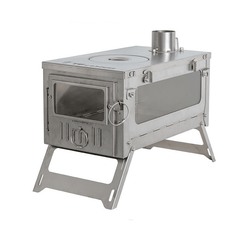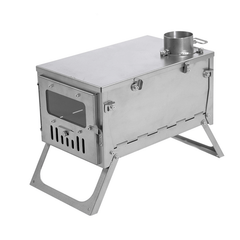
How to Effectively Prevent the Deformation of Titanium Stove?
The deformation of titanium stove is mainly related to 2 factors:
-
Quality of titanium stove
-
Unreasonable operation
The quality of the titanium stove itself is one of the most important factors in determining whether the titanium stove is deformed or not, including the grade and purity of the titanium material used to make the stove, as well as the structure of the stove. High strength and high purity titanium metal can well prevent the titanium stove from deformation, and a good structure can reduce the role of mechanical stress.
For many novice campers, they have less experience with titanium stoves. Thought and other metal stoves, the same as normal wood burning can be, in fact, titanium stove use process, there are many precautions. In fact, there are a lot of precautions during the use of titanium stove, including temperature control and maintenance after use.
Choose a wood stove made of high-strength titanium alloy:
Industrial Pure Titanium (CP Titanium): Industrial Pure Titanium is one of the most common titanium materials and the purest grade of titanium. It offers high corrosion resistance, excellent strength and low density. Industrially pure titanium is usually manufactured from materials with a purity of 99% or higher, with common grades such as Gr1 and Gr2. These grades of industrially pure titanium are suitable for general outdoor stove manufacturing, providing reliable performance and durability.
Based on cost-effectiveness, American Standard Gr 1 (GB/T standard Ta 1) is the grade of material used in most wood stoves, and Tryhomy utilizes 99.6% pure Ta 1 titanium as the raw material for each of our stoves to ensure the strength and durability of our stoves.


Titanium Alloys: Titanium alloys are materials obtained by alloying titanium with other elements such as aluminum, vanadium and zirconium. Titanium alloys have higher strength and heat resistance, and have a wider range of applications than industrially pure titanium. Common grades of titanium alloys include Ti-6Al-4V (Gr5) and Ti-3Al-2.5V (Gr9). These titanium alloys are suitable for tent stove designs that require greater strength and durability. Due to the high price of titanium alloys, only some titanium stoves choose this material as a raw material.
Thickness: The thickness of a titanium tent stove also needs to be considered. A moderate thickness will provide adequate structural strength and durability while keeping the weight low. Too thin a thickness may result in a stove that is easily deformed or damaged, while too thick a thickness adds weight and unnecessary material waste. The main popular titanium stove thickness is 0.6-1 mm titanium plate.
Surface treatment: In order to improve the quality and durability of titanium tent stoves, special surface treatments such as anodizing, polishing or coating can be considered. These treatments can increase the corrosion resistance, wear resistance and aesthetics of the stove.
Optimize the structural design of titanium stove:
By optimizing the structural design of titanium stove, the effect of mechanical stress can be reduced, thus reducing the risk of deformation of the stove.
The structural design of a titanium stove requires consideration of several aspects to ensure that it is effective in preventing deformation. The following are some design recommendations that may help minimize deformation in titanium stove:
Add support structures: In the design of a titanium stove, support structures should be added to increase its stability. This can be accomplished by adding more supports and connections to ensure that the stove can remain stable during use.
Optimize thermodynamic design: Optimizing the thermodynamic design allows the titanium stove to handle high temperature and high pressure environments more effectively. For example, the material, structure and thickness of the stove body should be rationally selected to ensure that it can withstand the thermal and mechanical stresses of high temperature and high pressure.
The Science of Firing: Mastering Titanium's Heat Control
- The Gradual Heat-Up (The Golden Rule):
-
-
The Mistake: Never start with a roaring inferno. Rapid heating is the primary trigger for thermal stress.
-
The Pro Method: Employ a "Seasoning" or gradual heating technique. Slowly ramp up the temperature, allowing the entire stove body to heat evenly and adapt. This effectively minimizes the thermal stress gradient (the core cause of warpage).
-
- Precise Temperature Management:
-
-
Use the stove's damper and air intake controls to maintain a steady, controlled burn, ensuring the internal temperature remains below the titanium's critical stress threshold.
-
- Ensure Uniform Heat Distribution:
-
-
Avoid concentrating the heat in one spot. Distribute the fuel load (kindling/wood) evenly within the firebox to prevent localized hotspots and subsequent uneven expansion.
-
- Minimize Thermal Cycling:
-
-
Try to reduce the number of times you allow the stove to completely cool down and reheat (frequent hot-to-cold cycles). Optimize your camp schedule to keep the stove active if possible, reducing the build-up of fatigue stress.
-
Long-Term Care:The Secret to a Lifelong Titanium Investment
- Thorough Cleaning and Drying:
-
-
After every trip, completely remove all ash and residue from the firebox and flue.
-
Crucial Step: Always ensure the stove is bone-dry before storing. Moisture combined with any residual soot can lead to accelerated corrosion (rusting isn't a titanium issue, but moisture causes other structural problems).
-
-
Seal and Structure Inspection:
-
Periodically check the door gaskets, chimney connections, and flue collar for integrity.
-
Inspect the walls and legs for any signs of obvious bowing, micro-cracks, or loose fittings. Address issues immediately to prevent them from worsening under heat.
-
-
Fuel Quality Matters:
-
Use only dry, well-seasoned wood. Avoid "green" (wet) wood or materials with high sap/chemical content, as these produce excessive creosote and corrosive smoke that can damage the stove over time.
-
In summary, in order to effectively prevent the deformation of titanium stove, it is necessary to control the heating temperature, heating speed and uniform heating, as well as to use high-strength titanium alloy materials, optimize the structural design of wood stove, as well as regular maintenance and repair of titanium stove.


